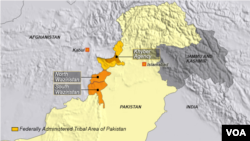Pakistan reported Saturday that multiple militant attacks killed at least 16 soldiers, with most of the casualties occurring in areas bordering Afghanistan.
Authorities said that heavily armed insurgents targeted Pakistani security forces in Kurram, a border district in Khyber Pakhtunkhwa province, killing seven personnel and wounding two others.
A local security official confirmed the casualties to VOA on the condition of anonymity because he was not authorized to speak to the media.
The Tehreek-e-Taliban Pakistan (TTP), a globally designated terrorist organization, reportedly claimed responsibility for the violence.
Attack follows ambush
The Pakistan military did not immediately comment on the deadly attack. It came hours after insurgents ambushed a military convoy in the province's North Waziristan district adjacent to the Afghan frontier late Friday. That assault resulted in the deaths of at least six soldiers, including an officer.
A brief Pakistani military statement confirmed the fatalities in the ambush, stating that six assailants were killed in the ensuing exchange of weapons fire. It did not provide further details and identified the slain militants as "Khwarij," an official reference to TTP.
Multiple area Pakistani security sources told VOA that the gunfire also resulted in injuries to at least 22 soldiers.
Insurgents detonate roadside bomb
Meanwhile, officials in southwestern Balochistan province reported that insurgents detonated a roadside bomb near a military convoy Saturday, killing three soldiers and injuring four others.
The outlawed Baloch Liberation Army, or BLA, claimed responsibility for the bombing in the Kalat district. It routinely targets Pakistani security forces and government installations in the province.
Khyber Pakhtunkhwa and Balochistan, both bordering Afghanistan, have seen a significant increase in militancy and separatist violence since the Taliban regained control of the neighboring country three years ago.
Pakistan claims that the TTP, also known as the Pakistani Taliban, operates from Afghanistan and carries out cross-border attacks with the support of the Taliban government.
Islamabad alleges that BLA and its allies are also increasingly using Afghan sanctuaries to orchestrate deadly attacks in the country.
A report this week by the Center for Research and Security Studies documented nearly 1,000 deaths of Pakistani civilians and security forces in the first nine months of this year.
The Islamabad-based think tank reported that attacks by TTP and Baloch insurgents caused most of the casualties in Khyber Pakhtunkhwa and Balochistan.
The Taliban government, which is officially not recognized by any country, denies Pakistan's allegations and insists that neither TTP nor other foreign militant groups are on operating on Afghan soil.
However, recent United Nations Security Council assessments have disputed the Taliban's assertions and described TTP as "the largest terrorist group" in Afghanistan.
Moscow Format
A conference of regional countries hosted by Russia on Friday also "expressed deep concern" over the threat of terrorism emanating from Afghanistan.
A joint statement issued after the meeting organized under what is known as the Moscow Format of consultations noted that "all terrorist and separatist groups, based in Afghanistan, continue to pose a serious threat to global and regional security."
The participants called on de facto Afghan authorities to take "visible and verifiable actions" in line with their international obligations to fight "terrorism, dismantle and eliminate all terrorist groups equally and [non-discriminatorily]." The meeting urged the Taliban to prevent the use of Afghan territory against its neighbors, the region, and beyond.
Delegations from China, Pakistan, India, Iran, Russia, Kazakhstan, Kyrgyzstan, Tajikistan, and Uzbekistan attended Friday's conference, with Taliban Foreign Minister Amir Khan Muttaqi in attendance as "guest of honor."
Muttaqi, while addressing the Moscow Format gathering, disputed terrorism-related international concerns, claiming their government restored "security and stability" in Afghanistan. He emphasized that the Taliban are in control of the entire Afghan territory and that no one can use it to threaten regional security.
"Occasionally, representatives of some countries in the U.N. Security Council and the media express their concern about the existence of threats on Afghan soil," the chief Taliban diplomat said.
"We believe that the information gap about Afghanistan or disinformation by antagonist circles has found its way to international organizations," he stated without elaborating.
Asif Durrani, who served as Pakistan's special envoy to Afghanistan until last month, described the Moscow Format's joint statement as an important development.
"It calls upon the Taliban government to take measures against the terrorist organizations taking shelter in Afghanistan. Let's hope the Taliban listen to the sane advice," Durrani said.




